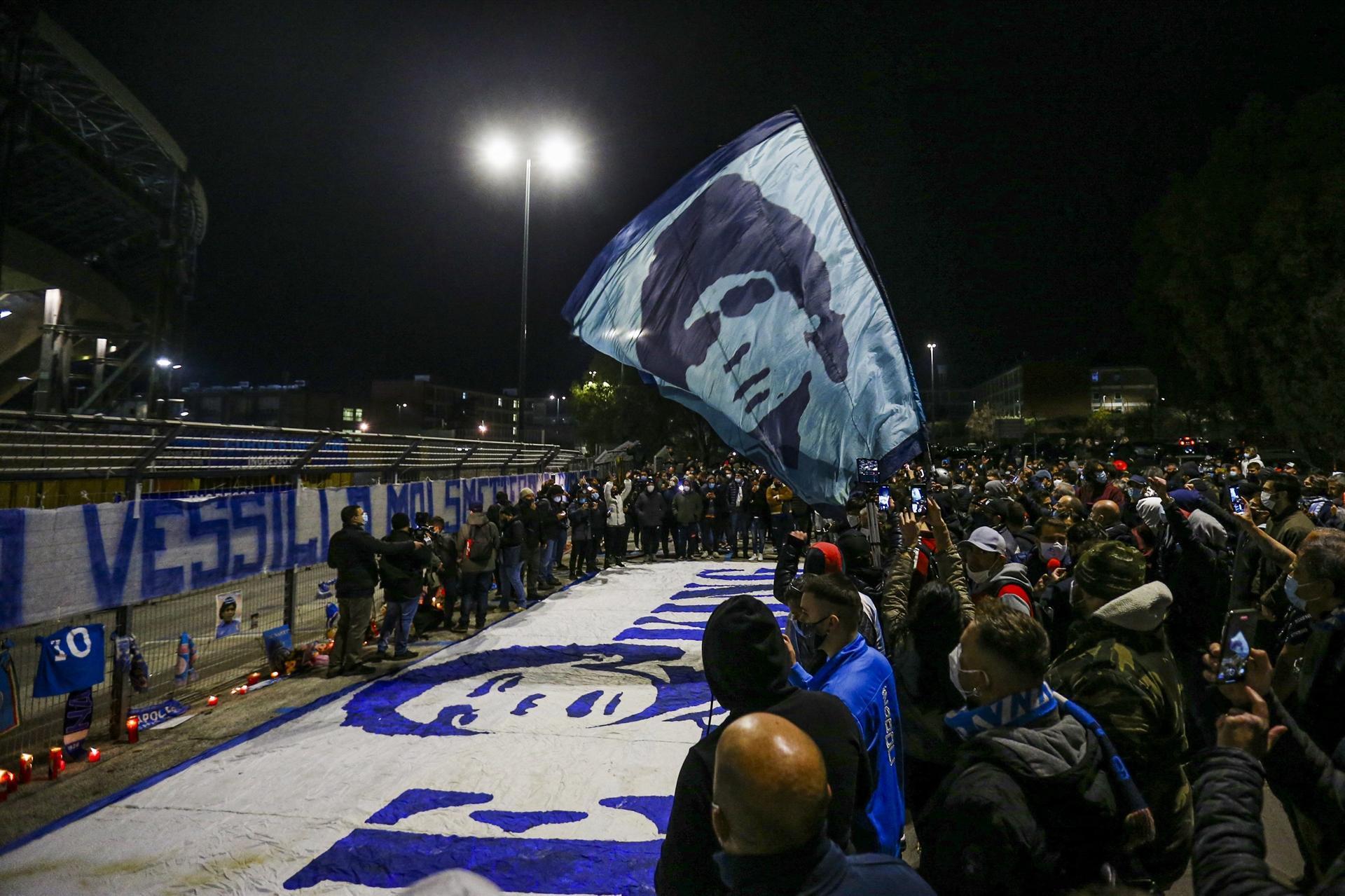
Millions of fans paid tribute and Argentina was sent into mourning on Nov. 25 as Diego Maradona, one of the greatest footballers of all time, died aged 60 after years of drug and alcohol problems.
Thousands of mourners, many in tears, and many wearing the World Cup-winner’s number 10 Argentina jersey, gathered in streets and at stadiums around Buenos Aires in spontaneous celebration of the player and manager’s riotous life.
The outrageously skilful Maradona, forever remembered for his "Hand of God" goal against England in the 1986 World Cup quarter-finals, died of a heart attack while recovering from surgery to remove a blood clot on his brain, a member of his entourage told AFP.
Family members were summoned to Maradona’s home north of Buenos Aires before his death was announced, triggering an outpouring of grief across the country and worldwide.
Argentina’s President Alberto Fernandez announced three days of national mourning, and players bowed their heads in a minute’s silence before Wednesday’s Champions League games in Europe.
Lionel Messi, Argentina’s modern-day superstar, led the tributes as he said: "He has left us but he will never leave us because Diego is eternal."
Brazilian legend Pele, 80, constantly compared with Maradona in the debate over football’s greatest player, called him a "dear friend" and said he hoped they would "play together in the sky" one day.
Public prosecutor John Broyard said Maradona’s death has "only natural characteristics". His body will lie in state in the presidential palace during the national mourning.
Despite major coronavirus problems in Argentina, with more than 1.3 million cases and a death toll topping 37,000, fans gathered at landmarks including Buenos Aires’ Obelisk monument and Argentinos Juniors’ Diego Armando Maradona Stadium, where he started his career.
Maradona, born in Lanus, just south of Buenos Aires, on October 30, 1960, also played for Boca Juniors, Barcelona and Napoli in a career of divine talent marked by wild highs and lows.
In probably his most famous moment, he leapt and used his fist to score past England’s Peter Shilton in the 1986 World Cup quarter-finals, memorably describing the goal as "a little with the head of Maradona and a little with the hand of God".
Minutes later he weaved through six English defenders from the halfway line to score an unforgettable solo second which was later honoured as FIFA’s "Goal of the century".
The two contrasting goals perfectly encapsulated the mixture of brilliant skill and often outlandish behaviour that ran through Maradona’s life.
Maradona’s highs were crowned by his performances at that World Cup, when he captained Argentina to glory.
After dismissing England he scored twice in the semi-final against Belgium, slaloming past four defenders for his second, and set up the 86th-minute winner in the final against West Germany.
It was to prove the highlight for Maradona, who inspired Argentina to the 1990 final only for West Germany to take their revenge. In 1994 - after an infamous, eye-bulging goal celebration against Greece - he failed a drugs test and was sent home in disgrace.
Gary Lineker, who was in the beaten England team in 1986, said Maradona was "arguably the greatest of all time", adding: "After a blessed but troubled life, hopefully he’ll finally find some comfort in the hands of God. #RipDiego."
Excesses with drugs and alcohol had long taken their toll on Maradona’s health. He was admitted to hospital three times in the last 20 years for serious health issues due to his addictions.
Maradona grew up in poverty in Buenos Aires but his extraordinary talent was clear from a young age at Argentinos Juniors and Boca.
He moved to Barcelona but was singled out for rough treatment by opposing defenders and soon fell out of love with the Spanish club.
It was in Naples where Maradona would enchant an entire city by leading the then unfashionable Napoli to their only two Italian league titles in 1987 and 1990, befriending a mafia family along the way.
"Always in our hearts. Ciao Diego," Napoli tweeted, while the club’s president and Naples’ mayor both called for the Stadio San Paolo to be renamed after Maradona.
In recent years, Maradona, reduced to hobbling by the ravages of his career and lifestyle, had coached in the UAE, Mexico and Argentina without ever hitting the heights of his playing days.
Maradona married his long-time girlfriend Claudia Villafane in 1984. They had two daughters, Dalma and Gianinna, but the relationship was punctuated by Maradona’s extra-marital affairs and they divorced in 2004.
He also had a son, Diego Junior, born in Naples in 1986, although he only acknowledged paternity in 2004.
In 2000, FIFA ran an online Player of the Century poll. Maradona gained 54 percent of the vote and Pele was second with 18 percent. FIFA declared them joint winners.